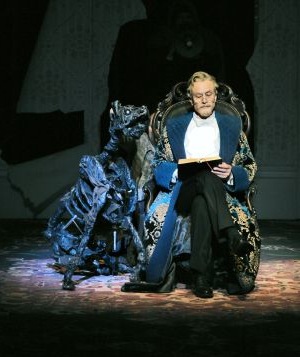
“6 January (entries made partly in pencil, partly in violet ink): Today, after the dog’s tail had fallen out, he quite clearly pronounced the word ‘liquor.’ Recording apparatus switched on. God knows what’s happening. (Total confusion.) Professor has ceased to see patients. From 5 p.m. this evening sounds of vulgar abuse issuing from the consulting room, where the creature is still confined. Heard to ask for ‘another one, and make it a double.’”
—Mikhail Bulgakov, from “Dr. Bormenthal’s Case Notes,” A Dog’s Heart
Bulgakov’s satiric leaps
On November 20 the adventurous English National Opera opened Russian composer Alexander Raskatov’s setting of Bulgakov’s satiric novel, “A Dog’s Heart” (1925). This co-production with De Nederlandse Opera had its world premiere in Amsterdam in June 2010. The original opera was set to lyrics in Russian by Cesare Mazzonis; the English translation was by Martin Pickard. For this rich and artistically thorough production the two opera houses’ collaborated with Complicite, the experimental theater company producing the work of Artistic Director Simon McBurney. The collaboration was a happy one, catching, as it did, the many layers of Bulgakov’s fantastic and complex satiric mind. The opera is not bathed in sentiment, appealing affect or even charming humor, which are more frequently found in opera’s purview; it is bold, raw satire, though from an era that has moved steadily into murky history.
A medical man as well as a member of the bourgeois class, Bulgakov devised this raucous Frankenstein story as a critique of early Soviet society: a professor, living in far too many rooms according to his petty bureaucratic house committee, entices a starving dog into his home in order to further his studies on human regeneration. Once the dog is plump and healthy the professor surgically replaces the dog’s testicles and pituitary gland with those of a human. Unfortunately, the human who provided the organs was a lout who died of drunkenness, and the dog undergoes a transformation for the worse, eventually becoming hairless, bipedal and progressing from a lazy and rather bad balalaika player to the Moscow municipal sanitation department’s director in charge of eliminating stray animals, especially cats. Perhaps worse is the destruction the man-dog wreaks on the life style of his “don’t-call-me-Dad” creator, Professor Filipp Filippovich Priobrazhensky. Eventually the professor reverses the operation, and normalcy of a sort is restored.
Raskatov’s leaping vocal lines
Using an orchestra ranging from balalaikas to an emphatic and drunken-sounding tuba and embellished with a plethora of percussion, Raskatov creates a reeling and rambunctious sound world for Bulgakov’s story, hurling into the musical mix phrases from other composers from Bach to Tchaikovsky to Verdi. Snippets of Russian folksongs, including “The Song of the Volga Boatman,” rise up and fade out. The music is layered and bubbling, and the vocal lines wildly challenging, glissing into the stratosphere and textured with low punctuations.
For the most part this is a comic production, but it does have moments of sadness. In the opening scene, the dog, starving on the streets of Moscow, struggles to hang onto its life. While the dog’s body is enacted by a life-size puppet, developed by Blind Summit Theater and expertly though rather obscurely handled by a pack of puppeteers, his “soul” is represented by two singers: his “pleasant voice” sung by countertenor Andre Watts and his “unpleasant voice” sung by dramatic soprano Elena Vassilieva. The two sing simultaneously: Watts providing the dog’s anxious meditations with a lovely haunting quality, and Vassilieva, singing through a megaphone, underlining Watts’ lyrics with a harsh growling and yapping.
When the dog Sharik becomes the man Sharikov, tenor Peter Hoare takes over vocal duties. And he is as gymnastic vocally as he is physically: whether climbing into his basket to lounge while plucking an out-of-tune balalaika or leaping around the stage, chasing moth-eaten cats, he infuses the role with doggy abandon and scabrous fervor, following the unpredictable vocal line from mid register up into shivering falsetto heights.
Nancy Allen Lundy marked out a similar coloratura part as the maid, Zina, taking equal enjoyment in her hysterical and pungent on-stage movements. And Sophie Demars delivered a brilliantly penetrating aria as dog-Director Sharikov’s secretary and fiancée. Baritones Steven Page and Leigh Melrose grounded the vocal landscape with their fine interpretations of the Professor and his assistant, Dr. Bormenthal; the excellent ensemble of Proletarians filled out the vocal background.
From the blizzard, which storms across the sheer scrim in front and at the back of the stage, to the projected films of workers and stills of Russian newspapers to the pints of blood spurting from the dog’s surgery and the water flooding the apartment, the production shimmers easily between video projections to more traditional staging and sets—all under the flawless direction and choreography of Simon McBurney, who never missteps in his interpretation of the text or the music. Garry Walker ably conducts this madly wonderful and unwieldy score.
—Jaime Robles
Photo: Steven Page as Professor Filipp Filippovich Priobrazhensky with the dog puppet Sharik (Blind Summit Theatre). Photo by Stephen Cummiskey
